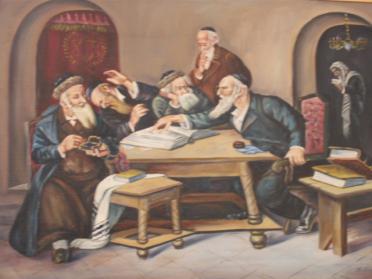Every week, parshaoftheweek.com brings you a rich selection of material on parshat hashavua, the weekly portion traditionally read in synagogues all over the world. Using both classic and contemporary material, we take a look at these portions in a fresh way, relating them to both ancient Jewish concerns as well as cutting-edge modern issues and topics. We also bring you material on the Jewish holidays, as well as insights into life cycle rituals and events...
In all of the insanity and stupidity of this past week, all over the globe, it’s certainly difficult to choose the worst of the perverse decisions, statements, and policies that were rolled out by our “leaders”. I’m going to, almost at random, pick two: Trump’s calling the press “enemies of the people” (he’s uttered this obscene threat before, but this time it was with the added fillip of comparing the media, unfavorably, with Putin the murderer and Russia), and the news that a well known, long-time supporter of Israel was stopped and interrogated at Ben Gurion Airport for the crime of having a pro- Palestinian pamphlet in his baggage.
This week’s portion, Devarim, is the beginning of a long record of Moshe’s last words. Before dying, and leaving Yehoshua to take the nation across the Jordan and into the land of Canaan, Moshe delivers a harsh, difficult, message, reminding the Israelites of their sins and shortcomings all through their journey through the desert, warning them that they will, in the future, continue to sin, be punished for it, and, relatively briefly, though beautifully, offering hope that they can and will straighten up and fly right, and return to God and his covenant.
The first verse of our portion, which kicks off Moshe’s lengthy speech, says this: “These are the words that Moshe spoke to all Israel…” The Rabbis pick up on the phrase “to all Israel”, and tell us the following: Moshe was careful to make sure that all of the nation of Israel attended the meeting, and were there to hear his address. The reason for this is that, had he left anyone out, those who were NOT there, but were elsewhere, like, for example, out shopping in the marketplace, would hear about the meeting and complain to those who did attend: “What? You were there, heard the son of Amram [that’s Moshe’s father, his name was Amram] say these nasty thing about us, and didn’t argue with him? Well, if we were there, we would have answered this, or that, or the other.” To prevent this critique from being voiced, Moshe was careful to insure that everyone attended, as if to say: you are all here, listening. If anyone has anything to say in response, or in disagreement, go right ahead.
Aside from the humorous element here – “Oh, what a shame I wasn’t there! If I was there I would have really given it to that son of Amram!” - there is, I think, a very important lesson here about leadership, free speech, and democracy. Moshe knows that a message is not really a message unless everyone has the right, and the ability, to respond to it, criticize it, disagree with it. Had some folks been allowed to skip the meeting, the claim “Why didn’t you say this to him? Why didn’t you say that to him?” would be a real one, a fair criticism of the message and the way it was delivered. Therefore, Moshe is careful to invite everyone to come and weigh in; to disagree, if they like, to contradict him, if they think they can. Lacking this transparency, this invitation to dialogue and debate, Moshe’s message would be weakened, challenged, diminished; forever open to the criticism that “well, we were not given the chance to respond, to argue, disagree, or discuss, which we would have, had we been there.”
I also think that the use of the phrase “the son of Amram” instead of his name, Moshe, is meant to emphasize Moshe’s humanity: like all of us, he is only human, born of man and woman. As such, we are all certainly entitled to voice disagreement with whatever he says.
Trump’s childish, pathetic, un-American, and ultimately dangerous war on the free press, and the Israeli establishment’s growing discomfort with, and outrageous responses to, criticism, opposition, and debate, are examples of a basic and profound lack of understanding of how to lead, how to rule, and how to run a democracy. Moshe teaches us here that, when discussing policy, or history, or anything, actually, all voices must be welcome, all opinions must be included, and everyone has an absolute right to weigh in. Moshe is sure to invite everyone to attend, and to respond, because he knows that leadership that is not open to disagreement is weak, open to charges of illegitimacy, and, ultimately, ineffective.
Now is the time for all Americans, and all Israelis, to stand up and say “This is not OK. This is not the way we should be running our countries. The free press is not our enemy, and criticism or debate of Israeli policy is not disloyal or dangerous.” To shut down dissent goes against the basic Jewish values to which Moshe was loyal when he invited everyone to come hear what he had to say and respond if they like: the Jewish tradition of open and respectful debate which fills every single page of the Talmud, and which makes the Jewish people who they are.Shabbat Shalom,
Shimon



Get inspired by Devarim Divrei Torah from previous years